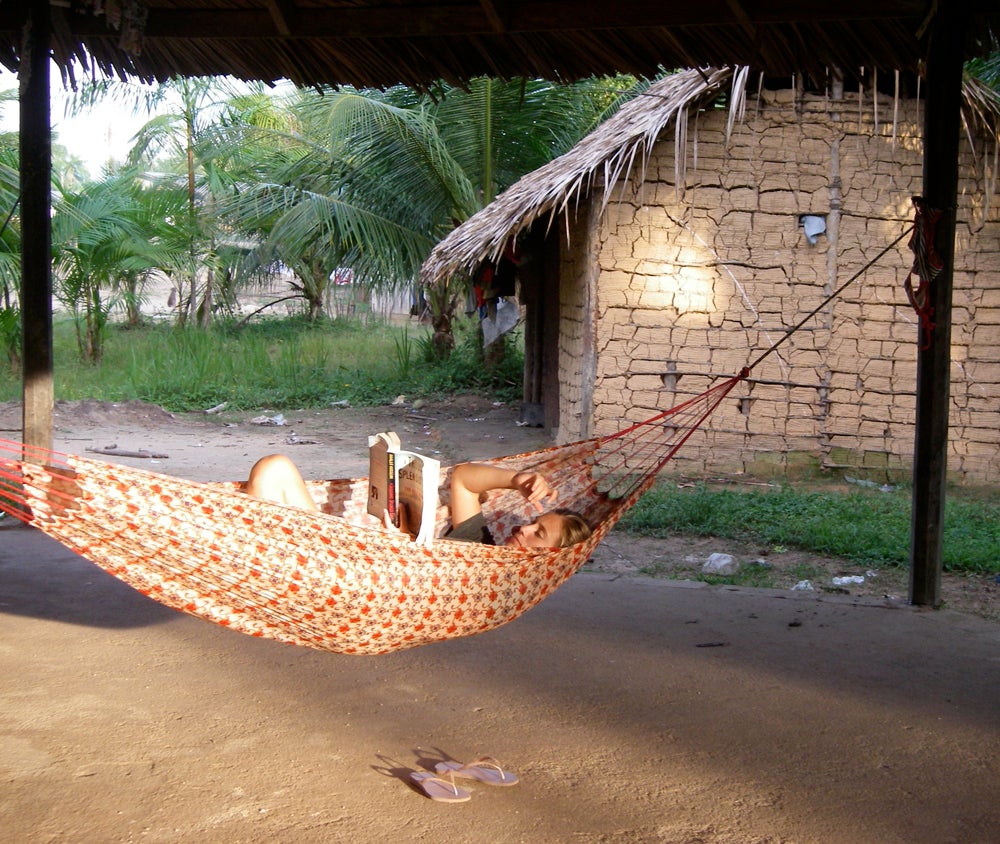My husband, Peter, opened his eyes. An old man stared down at him.
“����,” Peter said in Portuguese. The man’s face crinkled into a delighted smile.
The man had the textbook Yanomami haircut—short bangs cut straight across, black hair neatly sculpted around the ears.
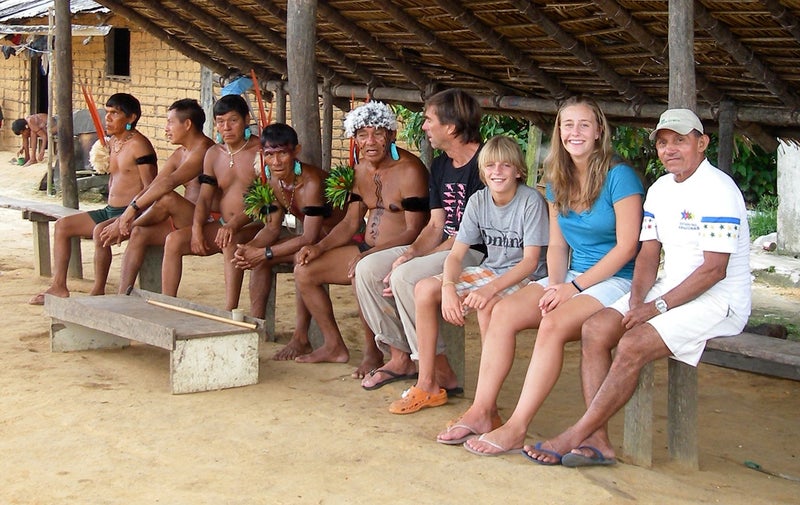
When planning this trip to the Amazon, where we were staying in an open-sided, thatched pavillion, Peter, our kids, and I had had a meeting. We discussed what each of us was hoping for. Peter was clear. He wanted to find the Yanomami. He had majored in anthropology in college and one of the classes that stuck with him, 40 years later, was the one about this tribe. It had stunned the world that there existed a people living totally detached from modern life as late as the 1960s, when these people, upriver in the Amazon, came into the public eye. Peter had read a book he still remembered, by a French anthropologist, titled , which described the ritualized violence they used to settle disputes.
“In my youth, it was a benchmark tribe for exoticism,” he’d told me.
“Do you think they have blow guns?” our son, Skyler, had asked.
“Do you think we could really stay in a village?” our daughter, Molly, wanted to know.
I was eager for the kids to see a way of life that was really different from ours in the U.S. It seemed the Yanomami would offer that. I had to sheepishly admit we really just wanted to watch them. But so far they were mostly watching us.
Far from fierce, this man curiously staring at Peter looked gentle, kindly, old.
The day before, we’d left the town of São Gabriel da Cachoeira with Valdi, our hired guide. After two hours sucking our way through orange gumbo in a claptrap truck, we’d arrived at a clearing in the jungle. Waiting there in a tiny slough, was a 30-foot-long, motorized, aluminum canoe. It was getting dark. For the next eight hours, we wound through ever-braiding, ever-narrowing waterways between walls of impenetrable blackness. The kids finally fell asleep on the bottom of the boat, squeezed between the barrels, 1,040 pounds of oil and gas, our payment for being let into these Yanomamis’ lives. We finally arrived in this man’s village of perched high on a ridge, at 3 in the morning.
We were not exactly being held prisoner, but it was clear that we were not free to leave our “hotel.” The tribe was being careful. On their first contact with outsiders, many had died from imported diseases.
Our lodgings consisted of an octagonal concrete pad, a thatch roof, a central pole and eight posts around its circumference. We lounged in our hammocks, awaiting further notice, wondering about things like where to go to the bathroom. It felt as though we were floating in an eddy, that currentless pool at the sides of a river where fish wait and watch for passing food. We were waiting for things, people, to drift by, and they did; they were coming to look at us, the animals in the zoo.
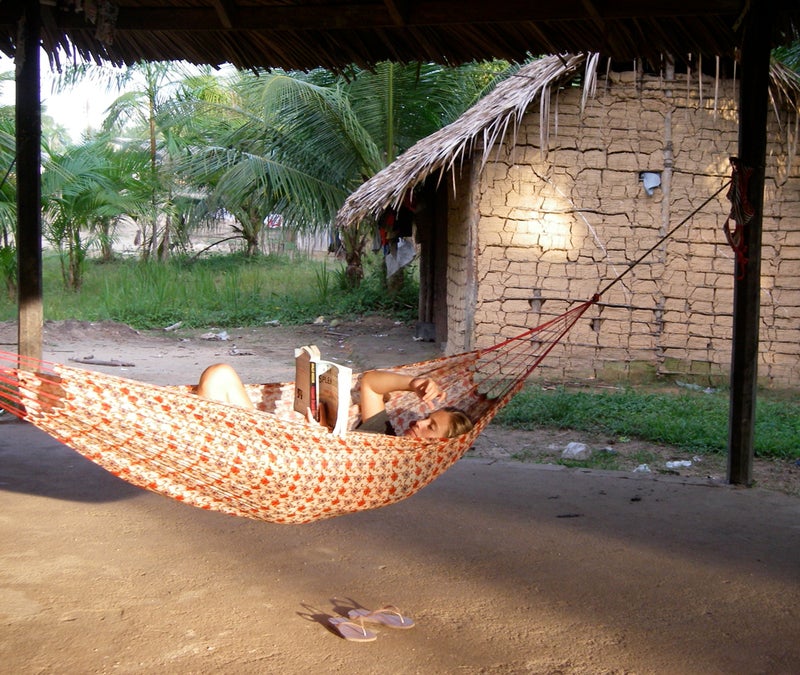
The rest of the day passed in suspended animation. The old man, as well as the chief of the neighboring village, a woman with a baby, a woman selling baskets—all drifted into our eddy. Eventually, we were summoned to lunch with Julio, the head of the village and Adelidegee, his wife. She’d grown up traveling with a German missionary—cooking his food, washing his clothes—so knew how to prepare meat the way white folks like it and had cooked what we’d brought. We sat in their outdoor kitchen, on plastic stools at a long, green-painted table.
The floor was concrete, the roof corrugated tin. Adelidegee washed dishes with funneled rainwater. Then there was the washing machine. I had another one of those double-take moments, as when I had learned their son Berto was studying to be a dentist back in São Gabriel, 10 hours away. Their grandkids tumbled underfoot with a gaggle of ducklings. Their daughter-in-law, an almond-eyed beauty, flitted around the edges. It was homey. We sat. They sat. We were all trying to feel our way through this. Why were we there?
The next day Julio showed up at our eddy pond with a teacher of indigenous arts from the neighboring village. We’d been trying to figure out how to connect and had asked about crafts.
“Marcelino can teach your son to make an arrow,” Julio said in Portuguese, “and his daughter can teach your daughter to weave baskets.”
We jumped up.
“W����?”
“L���ٱ��.”
We sat back down.
Eventually the moment came. As we wound down the ridge on a narrow path, a man and his two daughters caught up and followed us. A hundred-foot-wide river separated the two villages. We arrived at its bank. On our side, there was no boat. In seconds, the daughters enthusiastically jumped in, swam across and dragged back a large aluminum canoe. It had, however, no motor and no paddles. Valdi was shaking his head.
“How we goin’ to cross?”
The man waved at us to get in. Climbing in last, he dangled his legs into the water where the motor would be and started to kick. Valdi’s eyes sparkled.
“An Indian motor,” he laughed, proudly I thought.
We climbed the opposite bank and followed the path into Marcelino’s village, a collection of mud and thatch huts around a packed-dirt opening hacked out of the jungle. It was baking in the midday sun. Marcelino was lounging in the shade under a shed roof with his daughter and a clot of milling kids. He had the same gentle, kindly smile. Hanging on his bare, mahogany chest was a sky blue, beaded square in geometric designs.
“You want to make an arrow?” he asked Skyler in Portuguese.
“Sim,” Skyler responded.
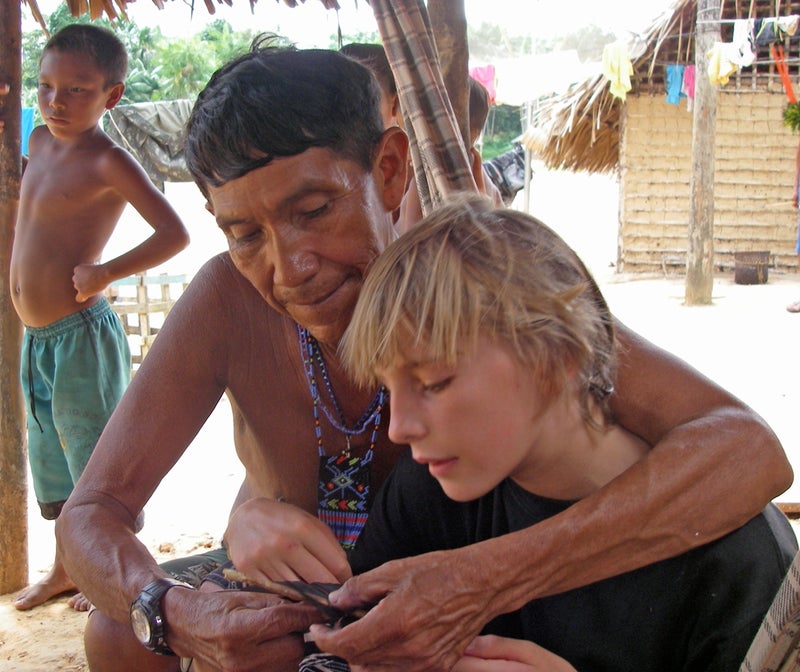
Marcelino proceeded to walk Skyler through the meticulous steps: First, he chose the right wood for each of the arrow’s three parts—the tip, the shaft, the tail; then he inserted one into the other, wrapping the joint with string dredged in glue made of tree sap and beeswax. And so it went, both quietly concentrating; Marcelino putting an arm around Skyler’s shoulders to show him how to hold a knife or wrap the hard shaft of a Curacao feather; Skyler intently hunched over the arrow, oblivious to the naked boy at his shoulder, clutching a tattered kitten to his bare belly. I could see Skyler’s interest was sparked; perhaps he subconsciously understood the significance of such a moment, of learning to make something that would enable him to provide food; that this was one of the skills, one of those markers, needed to move into manhood. Markers we seem to have fewer and fewer of in the States.
Marcelino’s daughter, seated with Molly under the same shed roof, might have been in her 30s and had the same worn look I’ve seen on working mothers in the U.S. She showed Molly how to build up the side of a basket, sewing together the coiled fibers. Marcelino’s daughter spoke with that slow, cotton-headed sound of a person with a cold. A runny-nosed toddler clung to one of her knees. She looked less enthused to be “engaging” with the visitors. The number of curious kids leaning against the shed’s poles and squatting in the dirt grew. Who were these blonde kids? Why were they trying to make arrows and weave baskets?
It made me wonder what we pass down to our kids. In our circles at home, we don’t pass down this kind of hands-on skill so much as we pass down ideas: ways of approaching the world, of handling problems, of dealing with people. Peter and I were trying to hand down experience, global experience, from our childhoods to theirs; hand down the idea that there are lots of ways to live and one is not inherently superior to another. We were trying to hand down our curiosity, our enthusiasm for trying different things. At the moment it seemed to be working.
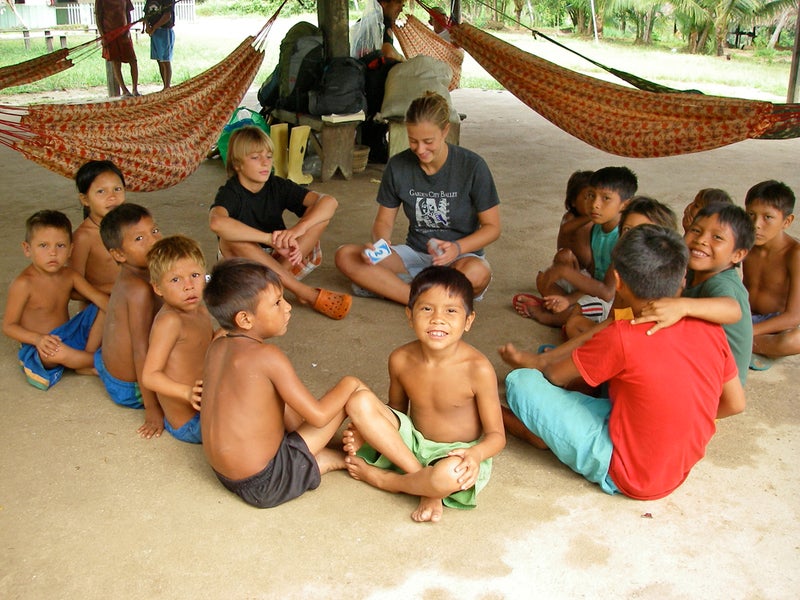
When we left Julio’s village three days later, we left our UNO cards with a child who lived in the hut next to our hammock pad. We left our blankets with Adelidegee and I gave my rubber boots to her son. I realized it was impossible for us to visit such a place and leave no trace. Even if we’d left nothing, the picture of us in our yellow rubber boots and zip-off pants, reading paperbacks and toting high-tech backpacks would still be there, along, perhaps, with a new germ of desire, and then maybe discontent. Or perhaps I flatter myself. Nevertheless, I felt guilty, greedy, for buying my way in to look at these people.
On the other hand, the gate had already been opened. The signs were everywhere: in the bras and T-shirts; in the new form of Mandioca root, introduced by missionaries; in the TV and the telephone, the generator that brought recorded music and movies, the washing machine and tether ball poles in front of every home. Some were probably improvements, others not. But who defines an “improvement?”
I was glad that the Yanomami were able to exert some control over who gets in and at what price. I thought it was probably important for both sides that Molly and Skyler should continue on in the world, knowing there were people like this living so differently; important that our kids should get a taste of what skill and knowledge these people have; important that they learn that these people don’t always need help, at least not ours, and if they do, to listen carefully and respect what they’re asking for.


